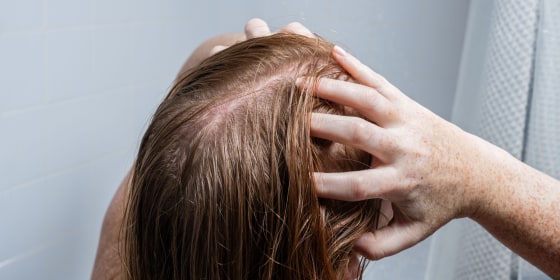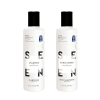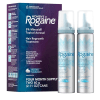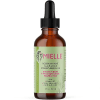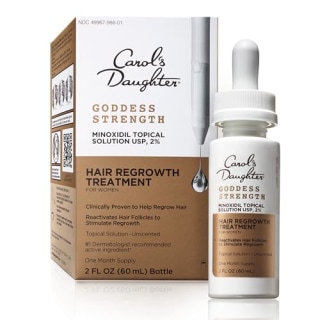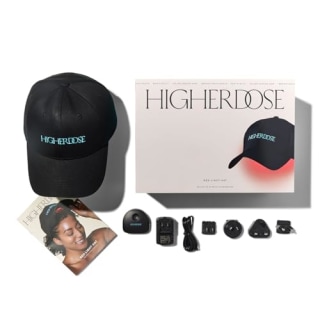I knew postpartum hair loss happened, but I didn’t realize just how tough it would be after I gave birth to my daughter. As a cancer survivor, I’d experienced hair loss before and knew the usual truths — it doesn’t last forever; it’ll grow back — but seeing my increasingly thinning hair was still upsetting during an otherwise happy moment in my life.
Unfortunately, postpartum hair loss is one of those hair concerns that’s impossible to prevent and hard to solve; because it’s driven by hormones, as with menopausal hair changes, you just have to wait it out. (In a nutshell: It’s your body course-correcting after pregnancy.) But using certain products and treatments in the meantime can set the stage for healthy hair regrowth and keep your existing strands strong and shiny. If you’re experiencing it yourself, dermatologists share ways that you can support your hair right now while you wait for this phase to end — which, I can vouch, it will.
How I picked the best postpartum hair loss treatments
I talked to five board-certified dermatologists, including those who specialize in hair loss, to create this list. While they told me that there’s no way to prevent postpartum hair loss, it’s still possible to support your overall hair and scalp health during this time. To create this list, I included products I tried myself and loved — particularly those in keeping with the experts’ advice. I also used their guidelines for products to use, which include:
- Nourishing ingredients: It’s a good idea to seek out ingredients that nurture both the scalp and hair, such as caffeine, panthenol and niacinamide; while they won’t necessarily spur hair growth, they can still create a good environment for it once your hair moves into its growth phase.
- Over-the-counter minoxidil: You can find minoxidil over-the-counter (or even get a prescription from your derm). Applied topically, it can help reduce shedding and encourage hair growth, even though it hasn’t been FDA-approved for the purpose of postpartum hair loss. (Talk to your doctor before starting this.)
- No potential irritants: Common ingredients like sulfates and silicones won’t necessarily harm your hair, but they can be drying or create buildup, respectively, which is why it’s worth avoiding them if you can. Sulfates, which are cleansing agents, are mostly found in shampoos.
- Oral supplements: Iron deficiencies can be common after birth and can impede hair growth, so ask your doctor to check your levels if you’re concerned. Prenatal vitamins (even postpartum) can provide minerals, vitamins and nutrients that help set the stage for healthy hair growth. (Talk with your doctor before taking any.) Our experts discourage biotin supplements, as they aren’t very helpful and can actually interfere with medical tests.
Want more from NBC Select? Sign up for our newsletter, The Selection, and shop smarter.
The best products for postpartum hair loss in 2025
Best Duo
Chicago board-certified dermatologist Dr. Omer Ibrahim points to this pair as a good option for anyone experiencing thinning or shedding hair — as happens with postpartum hair loss. While no shampoo will necessarily make your hair grow back, washing with gentle formulas that support a healthy environment for future hair growth is ideal; this bundle is so mild that they have the seals of the National Eczema Association and National Psoriasis Foundation (meaning they’ve undergone extensive vetting for safety in people with these skin conditions). They also have hemisqualane (an emollient) and bisabolol (an anti-inflammatory ingredient) to smooth hair and soothe the scalp, respectively, according to the brand.
Best Hair Oil
Dr. Dara Spearman, a board-certified dermatologist in Fort Wayne, Indiana, recommends this hair oil because it’s infused with rosemary oil. “Rosemary oil has been scientifically shown to promote hair growth and decrease shedding,” she says. “This formulation is also infused with biotin to improve function and prevent shedding.” (Plus, it’s especially great for 3A through 4C curls, as experts have told us in the past in our guide to curl types.)
Best Hair-Growth Treatment
Multiple dermatologists recommended minoxidil as a stopgap for postpartum hair loss. “Minoxidil increases blood flow to the scalp and over time lengthens the anagen, or growth, phase of your hair cycle,” says Dr. Donna Hart, a board-certified dermatologist in Austin, Texas. So while it won’t reduce shedding, it can help you make the most of the regrowth. Ibrahim, for his part, calls it a “tried-and-true” ingredient. This has 5% of minoxidil that you apply directly to your scalp (massaging in with your fingers) and should yield results in 120 days, according to the brand.
Best Hair-Growth Serum
Spearman points to this serum as a worthwhile treatment with minoxidil, which again “has strong scientific evidence of improving hair growth and decreasing the effects of shedding,” she says. It has 2% minoxidil, which is lower than the 5% offered by Rogaine mentioned above, but some might find the dropper applicator easier for applying directly on the scalp or to targeted areas, like the temples and hairline.
Best Red-Light Therapy Treatment
Studies have found red-light therapy to be helpful for hair growth, since it encourages cellular activity in the hair follicles — and Ibrahim attests to its potential for hair growth. (It’s also used in skin care to help address acne and rejuvenate skin.) While it’s tough to make definitive claims about it due to a lack of robust research, there’s a chance it could help hair regrow. This hat is cordless and is programmed for 10 minute-long sessions, and the wavelength of light — 650 nanometers — is what’s been used in studies.
How to shop for products for postpartum hair loss
When you’re treating postpartum hair loss, it’s important to set your expectations accordingly — because there’s nothing you can do to prevent or reverse postpartum hair loss. It’s the natural result of your hormones shifting after giving birth and a form of hair loss called telogen effluvium, which is a medical term for stress-related hair shed — the stress, in this case, being the sudden loss of estrogen. Because of that, “hair care routines and products will not help to reduce or stop postpartum shedding,” says Dr. Christine Shaver, a board-certified dermatologist in New York, NY. “However, good hair practices can decrease breakage and maintain a healthier scalp.”
For your regular wash-day routine, Ibrahim recommends washing with a sulfate-free shampoo and conditioners — as sulfates, which are common cleansing agents, can inadvertently strip the scalp of its natural oils and leave hair dry. Dr. Rachel Westbay, a board-certified dermatologist in New York, New York also recommends seeking out certain ingredients to support your overall hair and scalp health:
- Caffeine: This may stimulate blood flow and prolong the growth phase of the hair cycle when applied topically.
- Niacinamide, or vitamin B3: This soothes the scalp, improves barrier function, and may support healthier follicles.
- Panthenol, or pro-vitamin B5: This ingredient moisturizes and strengthens the hair shaft, reducing breakage.
- Rosemary oil: Clinical studies have found that this may be as effective as 2% minoxidil in improving hair thickness over 6 months.
- Peptides: These can help fortify weakened strands and reduce breakage, especially during brushing or heat styling.
While it’s not standard for use postpartum, almost all of our experts recommend minoxidil, which is FDA approved to treat female-pattern hair loss and can be used off-label (meaning not according to its FDA indication) to reduce the duration of telogen effluvium. However, “it’s not studied in postpartum-specific hair loss,” says Westbay, who recommends clearing it with your physician if you’re breastfeeding.
Red-light therapy devices for the scalp are also a promising option. “Red light therapy works by boosting the energy factories, or mitochondria, in your hair follicle stem cells, helping them produce more ATP — the fuel they need to grow stronger, healthier hair,” says Ibrahim. “It also improves blood flow and calms inflammation in the scalp, giving your hair the best possible environment to thrive and stay in its growth phase longer.”
Your nutrition is critical: Protein, iron, zinc and vitamin D are all important to support hair density and minimize shedding, according to Westbay. To make sure you get them, some of our experts recommend oral supplements. If you have an iron deficiency, for instance, this can interfere with hair growth — so Shaver recommends getting bloodwork if you’re concerned. If that’s the case, “then iron supplements are recommended to support new hair growth after a postpartum shed,” she says. (She recommends 325 mg ferrous sulfate — but again, talk to your doctor first.) Alternatively, “eating a healthy diet — making sure to incorporate iron-rich foods such as leafy greens, meat, lentils or beans — is helpful,” says Hart.
What to avoid when dealing with postpartum hair loss
First, steer clear of ingredients that can potentially irritate the scalp — namely, sulfates. “These harsh detergents can strip natural oils, irritate the scalp and increase dryness or fragility of already-shedding hair,” says Westbay. She also advises avoiding silicones, such as dimethicone and cyclopentasiloxane, as these can weigh hair down and build up on the scalp, especially if you’re trying to maximize volume.
When it comes to your routine, it pays to be gentle. After all, although telogen effluvium is hair loss from the root, not mid-shaft breakage, “you do not want to be dealing with breakage on top of this root shed so limiting heat styling is helpful,” says Hart. In addition to heat styling, Ibrahim advises skipping chemical treatments that could also contribute to breakage, such as dyeing hair and keratin treatments.
Also, there’s really no need for loading up on popular supplements like biotin. The reality is that biotin “will only help your hair if you are deficient, which is very uncommon,” says Shaver. In fact, “biotin can obscure thyroid test results,” she says. Before you start taking any supplements, she stresses the importance of talking to your doctor to make sure they’re safe and effective, especially if you’re taking other medications or are breastfeeding.
Meet our experts
At NBC Select, we work with experts who have specialized knowledge and authority based on relevant training and/or experience. We also take steps to ensure all expert advice and recommendations are made independently and without undisclosed financial conflicts of interest.
- Dr. Dara Spearman, FAAD, is a board certified dermatologist and the founder of Radiant Dermatology Associates in Fort Wayne, ID.
- Dr. Donna Hart is a board-certified dermatologist at Westlake Dermatology in Texas.
- Dr. Omer Ibrahim, FAAD, is a board-certified dermatologist in Chicago, IL. He has a special interest in hair loss treatments.
- Dr. Christine Shaver is a board-certified dermatologist at Bernstein Medical Center for Hair Restoration in New York, NY.
- Dr. Rachel Westbay is a board-certified dermatologist at Marmur Medical in New York, NY.
Why trust NBC Select?
I’m a freelance beauty writer and editor who’s been covering beauty and health for more than a decade, including topics like retinol body lotions and urea skin care. For this article, I spoke to five dermatologists to narrow down the postpartum hair loss products to shop this year, and highlighted their recommendations for the best options to consider.
Catch up on NBC Select’s in-depth coverage of tech and tools, wellness and more, and follow us on Facebook, Instagram, Twitter and TikTok to stay up to date.
